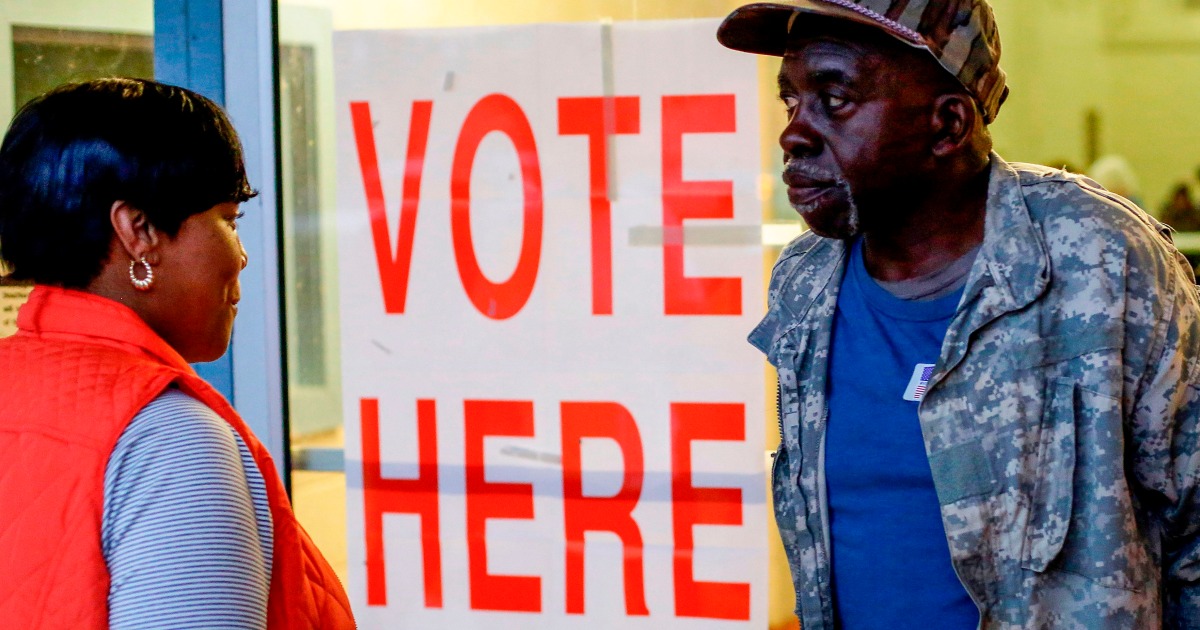So let me get this straight.....
The side who was pushing to get Civil Rights and Voting Rights passed were racist....
And the side who voted against Civil Rights and Voting Rights and basically any federal enforcement of constitutional rights for black people -- those are the heroes?
View attachment 781866
Guess that is why black voters all but abandoned the Republican Party after Goldwater was nominated...it's almost like policies matter.....
At least you are admitting what most other of you right-wing morons try to deny.....that Conservatives HAVE ALWAYS BEEN AGAINST CIVIL RIGHTS.....
You moron....you don't even know the fucking history........
The democrat party opposed all of the Civil Rights acts until the last one in 1964 when Johnson realized they had to finally get on board, or lose national elections.....you dumb shit.....
Again........
Johnson vs. Goldwater....
Gold Water was the Civil Rights hero.........blacks sold their children's futures to johnson and the racist democrats...
Johnson....the racist opponent to Civil Rights...
LBJ’s Democratic Plantation › American Greatness
https://amgreatness.com/2018/09/02/lbjs-democratic-plantation/
there is a man who, according to a memo filed by FBI agent William Branigan, seems to have been in the Ku Klux Klan. This memo was only revealed in recent months, with the release of the JFK Files.
Lyndon Johnson opposed every civil rights proposal considered in his first 20 years as lawmaker
"He had been a congressman, beginning in 1937, for eleven years, and for eleven years he had voted against every civil rights bill –
against not only legislation aimed at ending the poll tax and segregation in the armed services but even against legislation aimed at ending lynching: a one hundred percent record," Caro wrote.
"Running for the Senate in 1948, he had assailed President" Harry "Truman’s entire civil rights program (‘an effort to set up a police state’)…Until 1957, in the Senate, as in the House, his record – by that time a twenty-year record – against civil rights had been consistent," Caro wrote.
=========
The Party of Civil Rights | National Review
The Party of Civil Rights
The depth of Johnson’s prior opposition to civil-rights reform must be digested in some detail to be properly appreciated.
In the House, he did not represent a particularly segregationist constituency (it “made up for being less intensely segregationist than the rest of the South by being more intensely anti-Communist,” as the New York Times put it), but Johnson was practically antebellum in his views.
Never mind civil rights or voting rights: In Congress, Johnson had consistently and repeatedly voted against legislation to protect black Americans from lynching.
As a leader in the Senate, Johnson did his best to cripple the Civil Rights Act of 1957; not having votes sufficient to stop it, he managed to reduce it to an act of mere symbolism by excising the enforcement provisions before sending it to the desk of President Eisenhower.
Johnson’s Democratic colleague Strom Thurmond nonetheless went to the trouble of staging the longest filibuster in history up to that point, speaking for 24 hours in a futile attempt to block the bill. The reformers came back in 1960 with an act to remedy the deficiencies of the 1957 act, and Johnson’s Senate Democrats again staged a record-setting filibuster.
In both cases, the “master of the Senate” petitioned the northeastern Kennedy liberals to credit him for having seen to the law’s passage while at the same time boasting to southern Democrats that he had taken the teeth out of the legislation.
Johnson would later explain his thinking thus: “These Negroes, they’re getting pretty uppity these days, and that’s a problem for us, since they’ve got something now they never had before: the political pull to back up their uppityness. Now we’ve got to do something about this — we’ve got to give them a little something, just enough to quiet them down, not enough to make a difference.”
Read more at: The Party of Civil Rights
=============
Goldwater.....Civil Rights Hero
Barry M. Goldwater: The Most Consequential Loser in American Politics
Goldwater treated all people the same. As a private citizen, he flew mercy missions to Navaho reservations, never asking for recognition or accepting payment. He felt that “the red man seemed as much—if not more—a part of Arizona and America as any white or black person.”
[20] Moreover, a few weeks after Goldwater was discharged from the Army in November 1945, Democratic Arizona Governor Sidney Preston Osborn asked him to organize the Arizona Air National Guard. One of Goldwater’s first recommendations, soon approved, was to desegregate the unit. Goldwater’s integration of the state’s Air National Guard took place more than two years before President Harry Truman integrated the U.S. armed forces.
Goldwater was an early member of the Arizona chapters of both the NAACP and the National Urban League, even making up the latter’s operating deficit when it was getting started. Later as a Senator, he desegregated the Senate cafeteria in 1953, demanding that his black legislative assistant, Kathrine Maxwell, be served along with every other Senate employee after learning she had been denied service.
In the mid-1970s, a member of the Senate Intelligence Committee, investigating improper operations of the intelligence community in the United States, proposed that transcripts of the FBI tapes about Martin Luther King Jr.’s alleged indiscretions be published. An outraged Goldwater declared he would not be a party to destroying King’s reputation and strode out of the committee room. A fellow Senator recalled that Goldwater’s protest “injected some common sense into the proceedings,” and the electronic surveillance transcripts were not released.
[21]
That his opposition to the Civil Rights Act of 1964 was based on constitutional grounds and not political considerations was underscored in the final week of the fall campaign.
Speaking in Columbia, South Carolina, Goldwater condemned segregation and declared that government must treat “all men as equal in the arena of law and civil order.”
[22] He pledged if elected President to implement all provisions of the act. His forthright pro-civil rights speech was televised on 87 stations throughout the South.
---
http://www.newsmax.com/John-Gizzi/B...ights-Act-San-Francisco/2014/07/18/id/583541/
As for the Republican nominee's position on the Civil Rights Act, Goldwater had said he would vote for passage if Section II on public accommodations and Section VII on equal employment opportunity were removed. With his view reinforced by a detailed memorandum from Phoenix lawyer and future Chief Justice William Rehnquist, Goldwater felt these sections were unconstitutional, were unenforceable without a federal police force, and would lead to the creation of racial quotas and affirmative action.
"He was absolutely right about [the two sections of the Civil Rights Act] and they did lead to precisely what Goldwater and most conservatives were afraid of," said Tom Winter, then executive editor of Human Events, who would join Ryskind as its co-owner a year later. As for the "extremism in the defense of liberty" speech, Winter recalled watching it from a San Francisco restaurant "and cheering it because it was clearly about freedom and fighting communism. I certainly didn't think it had anything to do with race."
https://freedomsjournalinstitute.org/uncategorized/urban-legend-goldwater-against-civil-rights/
More specifically, Goldwater had problems with title II and title VII of the 1964 bill. He felt that constitutionally the federal government had no legal right to interfere in who people hired, fired; or to whom they sold their products, goods and services. He felt that “power” laid in the various states, and with the people. He was a strong advocate of the tenth amendment. Goldwater’s constitutional stance did not mean he agreed with the segregation and racial discrimination practiced in the South. To the contrary, he fought against these kinds of racial divides in his own state of Arizona. He supported the integration of the Arizona National guard and Phoenix public schools.
[4] Goldwater was, also, a member of the NAACP and the Urban League.
[5]
His personal feelings about discrimination are enshrined in the congressional record where he states, “
I am unalterably opposed to discrimination or segregation on the basis of race, color, or creed or on any other basis; not only my words, but more importantly my actions through years have repeatedly demonstrated the sincerity of my feeling in this regard…”
[6]. And, he would continued to holdfast to his strongly felt convictions that constitutionally the federal government was limited in what it could do, believing that the amoral actions of those perpetuating discrimination and segregation would have to be judged by those in that community. Eventually, the states government and local communities would come to pressure people to change their minds. Goldwater’s view was that the civil disobedience by private citizens against those business establishments was more preferable than intervention by the feds. He, optimistically, believed that racial intolerance would soon buckle under the economic and societal pressure.



